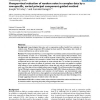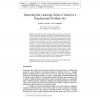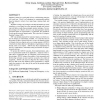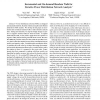1511 search results - page 69 / 303 » On the effectiveness of address-space randomization |
BMCBI
2008
13 years 8 months ago
2008
Background: Large biological data sets, such as expression profiles, benefit from reduction of random noise. Principal component (PC) analysis has been used for this purpose, but ...
TC
2008
13 years 7 months ago
2008
Network structure construction and global state maintenance are expensive in large-scale, dynamic peer-to-peer (p2p) networks. With inherent topology independence and low state mai...
AIED
2009
Springer
14 years 2 months ago
2009
Springer
Researchers that make tutoring systems would like to know which pieces of educational content are most effective at promoting learning among their students. Randomized controlled e...
ICSE
2008
IEEE-ACM
14 years 8 months ago
2008
IEEE-ACM
Intuition is often not a good guide to know which testing strategies will work best. There is no substitute for experimental analysis based on objective criteria: how many bugs a ...
ASPDAC
2009
ACM
14 years 2 months ago
2009
ACM
— Power distribution networks (PDNs) are designed and analyzed iteratively. Random walk is among the most efficient methods for PDN analysis. We develop in this paper an increme...




